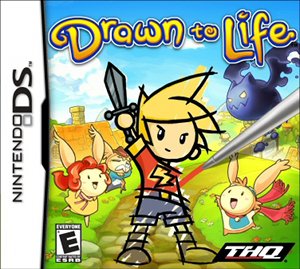
Adventures of Lolo is a puzzle video game released in 1989 by HAL Laboratory for the Nintendo Entertainment System. It is a compilation of puzzles from Eggerland: Meikyū no Fukkatsu and Eggerland: Sōzō he no Tabidachi. It is the fifth game in the Eggerland series, the third one released in Europe, but the first one released in North America. It was available on the Wii's and Wii U's Virtual Console in North America and in PAL regions, as well as on the Nintendo Switch Online's virtual Nintendo Entertainment System library.

AQ Interactive, Inc. was a Japanese video game developer and publisher. AQ stands for Artistic Quality. It was the parent company of the developers Artoon, Cavia and feelplus, and most recently the U.S. publisher Xseed Games. AQ Interactive and its subsidiaries produced games both under the AQ Interactive name, as well as developing for other publishers such as Microsoft Studios and Nintendo.

Hotel Dusk: Room 215 is a point-and-click adventure game for the Nintendo DS. Originally titled as Wish Room, the game made its first public appearance on May 9, 2006, at that year's E3 convention. It was originally released in North America on January 22, 2007, before being released subsequently in other regions. The game supports the Nintendo DS Rumble Pak accessory. The game was later republished in 2008 as part of the Touch! Generations line of DS games. The game was developed by the now-defunct Cing. A sequel, Last Window: The Secret of Cape West, was released in 2010 for the DS.

Secret Files: Tunguska is a 2006 graphic adventure video game developed by German studios Fusionsphere Systems and Animation Arts and published by Deep Silver for Microsoft Windows, Nintendo DS, Wii, iOS, Android, Wii U and Nintendo Switch. The game is the start of the Secret Files trilogy, with a sequel, Secret Files 2: Puritas Cordis, being released in 2008.

Drawn to Life is an action-adventure platform video game for the Nintendo DS developed by 5th Cell and published by THQ in 2007. It was later published by Agatsuma Entertainment in Japan in 2008 under the name Drawn to Life: God's Marionette, and in Korea under the title Geuryeora, Touch! Naega Mandeuneun Sesang. In the game, the player creates their own playable characters, level objects, and accessories by drawing them using the DS's stylus and touchscreen. The game was ported to iOS by WayForward and released by 505 Games in May 2014.

The Wii system software is a discontinued set of updatable firmware versions and a software frontend on the Wii home video game console. Updates, which could be downloaded over the Internet or read from a game disc, allowed Nintendo to add additional features and software, as well as to patch security vulnerabilities used by users to load homebrew software. When a new update became available, Nintendo sent a message to the Wii Message Board of Internet-connected systems notifying them of the available update.

Nintendo Software Planning & Development Division, commonly abbreviated as Nintendo SPD, was a Japanese research, planning and development division owned by Nintendo and housed inside the Nintendo Development Center in Kyoto, Japan. The division had two departments: Software Planning & Development Department, which primarily co-produced games with external developers; and Software Development & Design Department, which primarily developed experimental and system software. The division was created during a corporate restructuring in September 2003, with the abolition of the Nintendo R&D1 and Nintendo R&D2 departments.

The Japanese multinational consumer electronics company Nintendo has developed seven home video game consoles and multiple portable consoles for use with external media, as well as dedicated consoles and other hardware for their consoles. As of September 30, 2021, in addition to Nintendo Switch, Nintendo has sold over 863.07 million hardware units.

Little King's Story is a real-time strategy life simulation role-playing video game co-developed by Cing and Town Factory for the Nintendo Wii. The game was published by Rising Star Games in Australia on April 22, 2009, and Europe on April 24, 2009, by Xseed Games in North America on July 21, 2009, and by Marvelous Entertainment in Japan on September 3, 2009.

indiePub Entertainment, Inc. was a publisher of video games based in Cincinnati, Ohio, United States.

Mario & Sonic at the Olympic Winter Games is a 2009 sports and party game developed by Sega. Like its predecessor, it was published by Nintendo for Japan and Korea and by Sega in the Western world. The game is officially licensed by the International Olympic Committee (IOC) through exclusive license International Sports Multimedia. The game is the third official crossover title to feature characters from both Mario and Sonic's respective universes, the first and second being the game's predecessor Mario & Sonic at the Olympic Games and Super Smash Bros. Brawl respectively. It was released on the Wii and the Nintendo DS in October 2009, and is the first official video game of the 2010 Winter Olympic Games.

Mario is a Japanese multimedia franchise created by Japanese game designer Shigeru Miyamoto for video game company Nintendo, which produces and publishes its installments. Starring the titular Italian plumber Mario, it is primarily a video game franchise but has extended to other forms of media, including television series, comic books, a 1993 feature film, a 2023 animated film, and theme park attractions. The series' first installment was 1983's Mario Bros. even though Mario made his first appearance in 1981's arcade game Donkey Kong and had already been featured in several games of the Donkey Kong and Game & Watch series. The Mario games have been developed by a wide variety of developers, including Nintendo, Hudson Soft, and AlphaDream. Mario games have been released almost exclusively for Nintendo's various video game consoles and handhelds, from the third generation onward.

5th Cell is an independently owned American video game developer founded in 2003 as 5th Cell Media, LLC. led by Jeremiah Slaczka and Marius Falhbusch. The company is most well known for creating the Drawn to Life and Scribblenauts series.

Ōkamiden, known in Japan as Ōkamiden: Chiisaki Taiyō, is an action-adventure video game published by Capcom for the Nintendo DS handheld game console. It is a spiritual successor, rather than a sequel, to Ōkami, a game released originally for the PlayStation 2 and later ported first to the Wii, then to other platforms.

Tomodachi Collection,, is a social simulation video game for the Nintendo DS, released exclusively in Japan on June 18, 2009. A sequel, Tomodachi Life, was released for the Nintendo 3DS in Japan on April 18, 2013, and in North America and Europe on June 6, 2014.

Last Window: The Secret of Cape West, known in Japan as Last Window: Mayonaka no Yakusoku, is an adventure video game developed by Cing and published by Nintendo for the Nintendo DS handheld game console. It is the sequel to Hotel Dusk: Room 215, starring protagonist Kyle Hyde, and takes place one year after those events. Set in 1980 Los Angeles, the Cape West Apartments, the story deals with a new mystery in a new location, but it also delves into some unanswered questions from Kyle Hyde's past. Last Window was the last game developed by Cing before the company filed for bankruptcy on 1 March 2010. Unlike its predecessor, it was never released in North America. A successor titled Chase: Cold Case Investigations - Distant Memories would be released in 2016 developed by Arc System Works with many former developers of Cing working on the game.

Again: Interactive Crime Novel, known in Japan as Again: FBI Chōshinri Sōsakan, is a mystery adventure video game developed by Cing and published by Tecmo for the Nintendo DS. It was released in Japan on December 10, 2009 and in North America on March 30, 2010.

Chase: Cold Case Investigations - Distant Memories is a 2016 visual novel adventure video game developed by Arc System Works for the Nintendo 3DS. It was released in Japan on May 11, 2016, and in North America and Europe on October 13, 2016, courtesy of Aksys Games. The game revolves around detective partners who reopen a cold case, realizing it may have been the work of a murderer. It got mixed reviews from critics, who praised its artwork, music and story, but lamented its short length, lack of interactivity or difficulty, and abrupt ending, believing it felt like the intro for a larger, nonexistent game.

Cooking Mama is a video game series and media franchise owned by Cooking Mama Limited. The series is a cookery simulation-styled minigame compilation of many video games and adventures for Nintendo gaming platforms. Generally, the gameplay revolves around performing different kitchen tasks, through the instructions of "Mama", to cook various meals. The series so far consists of five main games on Nintendo DS and Nintendo 3DS, two spin-offs on Wii and DS each, as well as a spin off on 3DS. It is also a spin-off to the Gardening Mama series. The original Cooking Mama video game was also ported to iOS. A sixth main series game, Cooking Mama: Cookstar, was released for the Nintendo Switch and PlayStation 4 in 2021.



















